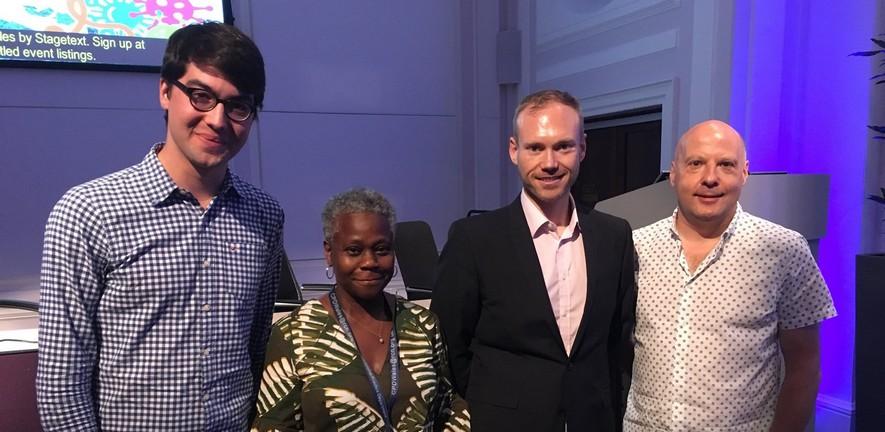Selwyn College doctoral student George Severs describes his research on HIV-AIDS activism in modern Britain

Figure 1: George Severs, Professor Dame Donna Kinnair, Dr Tommy Dickinson and Jason Warriner. Image from RCN Libraries on Twitter.
July 2018 saw the 22nd World AIDS Day Conference take place in Amsterdam. The city also hosted an AIDS Cultures and Histories Festival alongside the Conference, providing a series of opportunities across the month for historic and artistic reflection on HIV and AIDS, and the impact the epidemic has had and continues to have on individuals and communities in Europe and across the world.
Thanks to an international network of scholars working on HIV-related projects, London played host to an AIDS Cultures and Histories Festival as well. Throughout the month of July, more than 30 separate events and ongoing projects took place across the capital. These included talks given by activists, poetry readings, film screenings and archival tours. I was hugely honoured to be asked to speak at several of these events about my research into the history of HIV/AIDS activism in England between 1982 and 1997.
At the beginning of the month, the Royal College of Nursing (RCN) held a ‘late’ at which several individuals and institutions were invited to display their archival collections and outputs on the history of the epidemic in the UK. In a beautiful wood-panelled side-room, visitors were able to sit quietly and reflect as a series of clips were played from oral history interviews. These interviews, conducted by myself, Dr Tommy Dickinson and Jane Bruton, spoke to the history of nursing during the epidemic. The interviews from my work aimed to introduce visitors to the ‘unofficial’ nurses of the epidemic: the people who cared for people living with HIV/AIDS from outside the institutional confines of the medical professions. Those who came, for example, were able to hear from my interviewee Miriam, who explained that her cousin Barry had been cared for by a group of nuns outside Brighton after he had been turned away from hospitals in the mid-1980s:
he got to a point where he was down below, I don’t know, about 6, 5 stone something ridiculous. And of course because it was all this massive thing, in the press and on telly […] they wouldn’t take him in hospital, and yeah, so obviously he was far too ill to care for himself, he was bedridden, and the only place that he could go, people that could look after him were these nuns that took him in and nursed him right to the end, and they all came to the funeral.
Towards the end of the month, I was back at the RCN to take part in a panel discussion about nursing and the history of HIV/AIDS. Alongside Dr Tommy Dickinson and Professor Dame Donna Kinnair, we spoke about the histories of the people who nursed people living with HIV/AIDS during the late-twentieth century and the impact they had on their patients. This was a particularly moving occasion. A large proportion of the audience was made up of nurses, including people who had trained at the RCN in the late 1970s/early 1980s and who went on to nurse people with HIV/AIDS. Many of them commented that the event had been a moving one, describing feelings of gratitude that they had been able to reflect on their own careers and their roles in the broader history of the medical responses to the epidemic.
Events like these this year have been humbling and motivating. Seeing communities of people react so positively to their personal, political and professional experiences being historicised confirmed to me the public interest in the history of HV/AIDS, and in the desire of such communities to have their historical experiences ‘on the record’. The power of history is not just in our collecting and assembling stories, but in telling them in ways which are accessible and which, most importantly, facilitate and enable communities to share their own histories from the ground up.
George Severs is a second year PhD student in the Faculty of History and Selwyn College. His PhD thesis, supervised by Dr Lucy Delap, considers the history of HIV/AIDS activism in England between 1982 and 1997. He is Secretary of the LGBTQ Oral History Society Special Interest Group and co-convenes the Cambridge Gender and Sexuality History Workshop.
